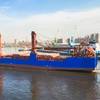TT Club Warns of Stowaway Risks
Clandestine migration has been a problem for the transport sector across Europe for some time now. While more stringent border crossing checks have been imposed due to the current COVID-19 crisis, the risk to operators is not diminished. Furthermore, as the restrictions on movement begin to ease migration activity could be set to escalate warns international freight insurer TT Club.
The smuggling of people has become a major issue in certain parts of the world. Political imperatives in target countries have led to stricter immigration restrictions and increased government action. International clandestine migration has become a persistent threat to the unitized supply chain.
No mode of transport can be considered exempt from clandestine movement of people. However, the risk is greatly heightened during the road modality. In Europe, BSI Supply Chain Services and Solutions statistics highlight that 86% of recorded incidents involve movement of cargo by road, which in the case of the UK also often involves a ferry crossing.Nor has the current COVID pandemic lessened the dangers. The effect is more that enhanced border control measures and travel restrictions have merely shifted the focus or means of smuggling activities temporarily. Indeed, according to a recent report[1] from the European Migrant Smuggling Centre (EMSC), part of Europol, migrant smugglers have been increasingly using small boats to cross river borders and the English Channel. More significantly for the freight industry, the report goes on to say there has also been a shift “to hiding of irregular migrants in concealments in freight vehicles and cargo trains that still move across the borders” during the COVID-19 outbreak.
“Our first consideration of course must be with the well-being of the migrants themselves, who are often victims of criminal activities and whose lives are often at risk,” says TT Club’s Managing Director, Loss Prevention Mike Yarwood. “In terms of the liabilities that transport operators are exposed to, however, TT Club is warning of potential physical damage to cargoes, additional freight costs, vehicle and equipment detention, fines, penalties and reputational damage,” Yarwood states.
Criminal organizations are often the facilitators of this clandestine movement. They know that the simplest way to move people across international borders is to hide them in legitimate freight transport.
Pre-COVID-19 there had been numerous incidents featuring the cross-channel route to the UK in the recent past, including the tragic case of 39 Vietnamese migrants found dead in a refrigerated road trailer last October. However, such events have not been limited to this type of cargo unit - as proved by the discovery in March of 10 Eritreans in a shipping container in Hull. The container was unaccompanied and was loaded onto a ferry in Zeebrugge.
TT Club emphasizes that all stakeholders who regularly undertake cross border freight movements must be vigilant. Close consideration should be given to the preventative guidance that governmental authorities produce. TT Club itself has collaborated with leading global provider of supply chain intelligence; BSI Supply Chain Services and Solutions to publish a StopLoss briefing entitled Clandestine Migration.
In the fast-changing COVID circumstances, the easing of ‘lockdown’ restrictions may further exacerbate the problems of illegal migration. “This might be a particular danger as regards potential movement into the UK,” states Yarwood. “Although cross-border freight services are still running during the COVID lockdown and therefore providing opportunities to migrants, it is likely that there are large numbers of people currently unable to move, who may want to cross to the UK and will attempt to as the restrictions on movement are lifted at first gradually and then fully.”
“Constant vigilance and awareness are the only ways to combat stowaways in these types of transport. Vehicles should be checked regularly en route to ensure that they have not been entered, particularly after stops when left unattended,” advises Yarwood. The briefing document details the measures that should be taken: specific training for drivers; precise security procedures; robust security devices to secure the vehicle, goods and cargo space; and practical measures before and during the packing process, and in transit.
Yarwood concludes, “Whilst owners, operators or drivers may contract with third parties to conduct the required checks on their behalf, they are likely to remain liable to any penalty and/or loss incurred. Consequently, due diligence in the selection of such contractors is critical.”













